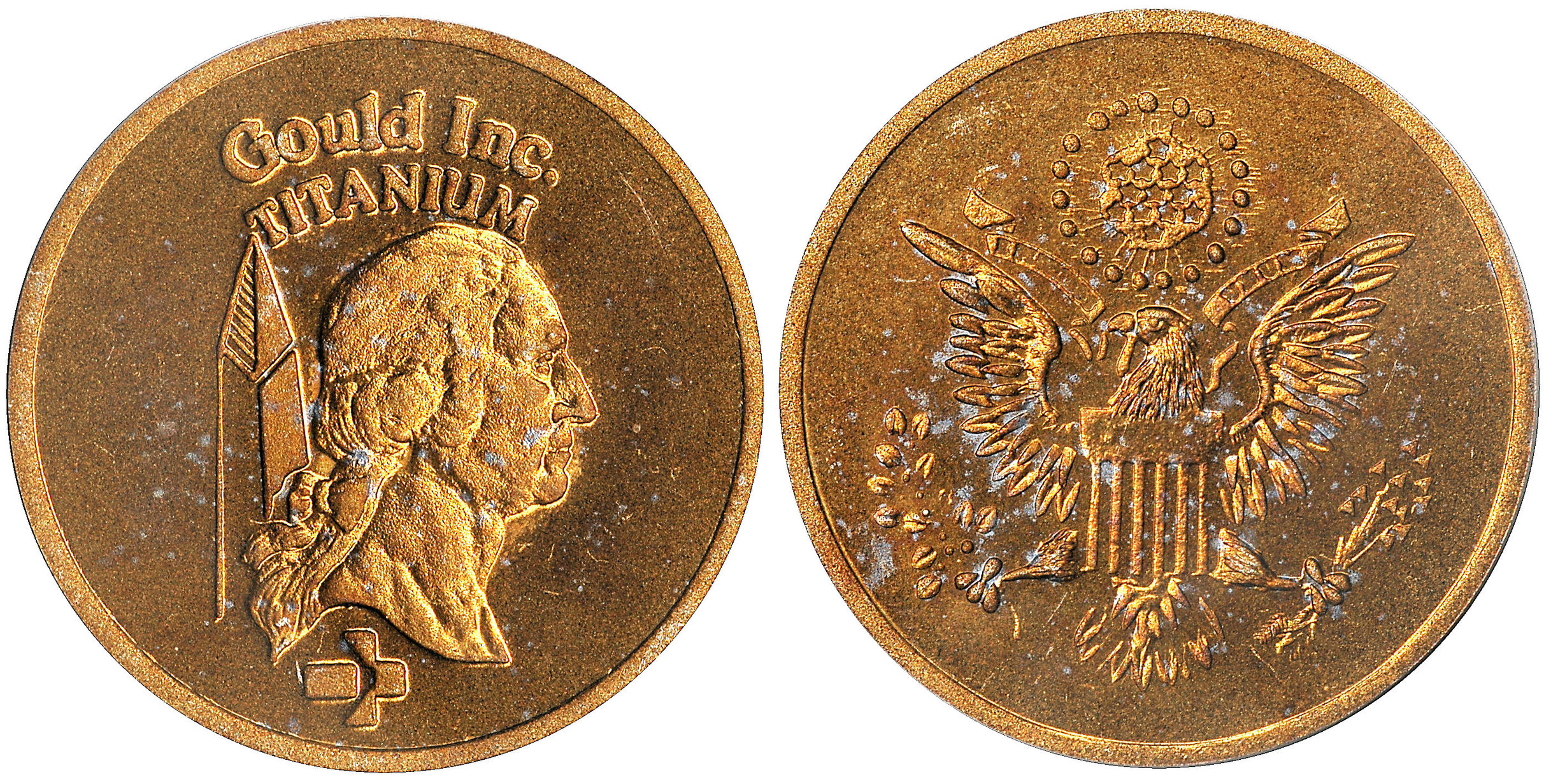Recent private pattern discovery - Gould, Inc.
 RogerB
Posts: 8,852 ✭✭✭✭✭
RogerB
Posts: 8,852 ✭✭✭✭✭
This is the first public photo and identification of a recently discovered Gould, Inc. private pattern piece made in 1978. This piece is titanium which has been anodized after incomplete cleaning. This resulted in parts of the original surface not being in contact with the electrolyte. The bronze color is created by using approximately 20 volts DC. Other colors are possible depending on voltage and time of immersion. Thus far, the item is unique.

This piece is Obv 1, Rev B, and will have a unique catalog number in the research article on Gould private patterns. There are six obverse and three reverse designs in the Gould series. This piece was donated to the Smithsonian National Numismatic Collection about 28 years ago by former ANA president David L. Ganz.
Comments
Very cool. I haven't seen a lot of anodized titanium except for anodized titanium fidget spinners recently. This is a first for a coin-related piece for me.
Maybe this was really Gould's attempt to make a spinner toy...?
The patterns are cool when you spin them. Wonder if the Smithsonian would let us take this one for a spin?
I don't know much about these but I thought I recalled that one/some were made from powdered Titanium that had been some how fused - is this one? (The surface looks a bit rough).
Hmmmm...given that I had to sign my life away and work under armed guards carrying automatic weapons, infrared cameras and be strip searched (no music, either), I kind of doubt anyone could take one for a "test spin."
 well -- a bit of a truth stretch -- difficult not to do given the proximity to the White House.
well -- a bit of a truth stretch -- difficult not to do given the proximity to the White House.
Yes. The metal is commercially pure titanium. The most common way to form titanium is by converting it to a very fine powder, compressing it to the desired shape and then sintering it. Sintering means heating to a high temperature but one below the melting point. This causes the powder grain edges to fuse and when done right, much of the space between powder grains becomes filled and solid. Sintered metals can be machined just like cast metal. This process has the advantage of permitting metals or materials that do not fuse under melting or welding conditions.
Too bad about the incomplete cleaning... saw similar effects during my years in an industry that used gold/copper and other materials for plating... either spots or peeling plating... Cheers, RickO
Titanium cookware is very popular, very tough and non-active, unlike aluminum. A little expensive.
Compressed and sintered powdered nickel was used by Sherritt-Gordon Ltd. to make Canadian nickel planchets in 1962. These are some of their samples given to the Mint Bureau.
The technology had been investigated by the US Mint since the 1930s, but it had never been shown to be advantageous for coinage at the scale required by the United States.
interesting.
BHNC #203
The Canadian planchets were a kind of 'backup' in the event of a labor action by the British supplier of nickel metal planchets.
US Military WW-II "Victory" medals were made from compressed and sintered bronze powder.
One more Gould anodized titanium private pattern piece has turned up. This makes five (5) including the Smithsonian piece.
There appears to possibly be one here. Unfortunately I don't have a record of here I got this photo from.
Could be. Also could be brass which is also known. The anodized pieces are made from titanium so they are light, but weigh more than aluminum. They also have the typical Ti granular surfaces.
PS: All known examples also have gaps in the anodized surface - likely from poor clearing prior to treatment.
Here's a sample of anodized titanium colors.
[Courtesy Titanium Finishing Company]
They'll need the oversized holders.
Fortunately, the Gould pieces are about the size of Anthony dollars.
Interesting item !!!
Interesting !!!